Leah Thomas ’17 is an environmental science and policy major who has worked as a lead resident advisor at Chapman and as a leadership intern for the Upper Newport Bay Ecological Reserve. She has also served as an editorial assistant for Kimberly Elise and in multiple roles aiding the National Park Service at President’s Park (The White House) and the Nicodemus National Historic Site in Kansas.
Alton Moore (JD ’17) is a third-year student at Chapman’s Fowler School of Law with a dual emphasis in tax law and business law. He has served in legal externships with the Office of Chief Counsel, Internal Revenue Service, and the U.S. Bankruptcy Court, as well as internships with The Ayco Company and Ernst & Young, for which he will begin work after taking the bar exam in July.
It’s getting late in the semester, and Leah Thomas ’17 is deep into the capstone project that will culminate her degree in environmental science and policy. Meanwhile, Alton Moore (JD ’17) ponders constitutional questions as he wraps up his Fowler Law studies and maps the intensive prep that’s his prelude to the bar exam.
Free time teases them like a wistful dream.
And yet the two Chapman University students don’t hesitate when asked to take part in a thoughtful exchange that at times will highlight their areas of expertise and at others nudge them into unfamiliar terrain.
“Life begins where your comfort zone ends,” Moore says.
The two find inspiration in a dialogue between Chapman professors Vernon Smith and Peter McLaren that ran in the winter issue of Chapman Magazine. Like the faculty scholars, Moore, a conservative-to-moderate Republican, and Thomas, a progressive Democrat, slip easily into a friendly discourse that belies their political differences and seems light years removed from the rancor of the most recent presidential campaign.
MOORE: I looked you up on LinkedIn. It’s pretty impressive what you’ve done. I didn’t do anything like that as an undergrad. How long ago did you start your blog?
THOMAS: I’ve been freelance writing all during my college career, but I started my blog “Green Girl Food” in January. I’ve been building an audience on Instagram, and that seems to work well. I’m getting the kind of traffic I want. I do interviews and write about sustainable food and plant-based eating.
MOORE: I would imagine that takes a lot of work.
THOMAS: It’s a lot of work to attract followers, but it’s a pretty fun space. I write about more serious things, too, but food is a passion.
MOORE: Dennis mentioned that you had worked in Kansas and met the farmers there and learned their opinions about EPA regulation. How was that experience?
THOMAS: I got involved with the Student Conservation Association, which has internships with the National Park Service. My first one was in rural Kansas, where I worked alongside a lot of farmers because it was the time of the annual wheat harvest. So I rode on combines and talked with them about environmental policy. I learned there is a big disconnect between environmental policymaking and rural Kansans. To many of them, the government is Big Brother, telling them they can’t use certain pesticides. Even though I’m one who thinks they shouldn’t use pesticides that are found to be harmful to the environment, I realized that policy is just getting handed down to these farmers without any face-to-face interaction. At that time I wanted to someday work for the EPA, so when I told them that, I was surrounded by farmers every day telling me what they wanted to tell the EPA.
MOORE: Sounds like you learned a lot. I imagine that if you’re a farmer in Kansas, you can feel pretty isolated from Washington. You work long hours, and your life is getting harder.
THOMAS: It’s true. And then they get a letter in the mail or a phone call telling them they aren’t allowed use a certain pesticide anymore. It’s like their rights are being taken away. This is at the same time that their children are going to college in Kansas City or somewhere even farther away, and often they aren’t coming back to help. It’s like the family business is dying, and that’s very sad.
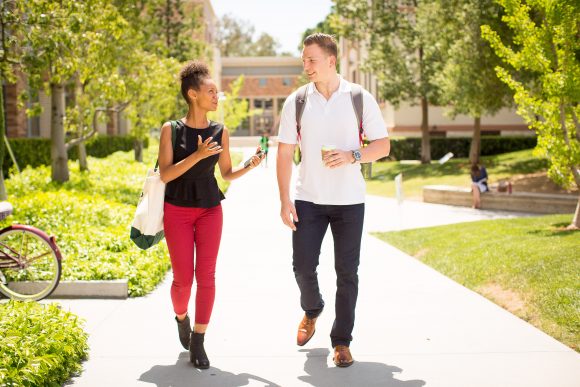 MOORE: I know that Trump has picked Scott Pruitt to head the EPA, and you probably know more about this than I do. What are your thoughts on rolling back regulations?
MOORE: I know that Trump has picked Scott Pruitt to head the EPA, and you probably know more about this than I do. What are your thoughts on rolling back regulations?
THOMAS: It’s hard. Growing up, I always thought that science would be the kind of thing people trusted. I’ve always loved science and math and thought facts were facts. It was a dream job in my freshman year to work with the EPA. It’s not anymore. What’s happening has made me go more in the direction of state environmental protection.
MOORE: I’m one who tends to focus on what’s proven. I tend to agree with the 97 percent consensus (among climate scientists) that we are contributing to carbon emissions and should address that. I’ve also been reading some articles about the coal industry. Trump is a jobs president, and that influences his thinking. He wants to bring back the jobs of hard-working coal miners. But even the coal industry acknowledges that they’re not going to be able to hire back all the workers.
THOMAS: At the same time that I’ve dedicated my life to science, I don’t want people to trust things blindly. So I understand why people are not so trusting of the government. People have been hurt on both sides. However, I think it’s time for scientists to become a bit more political. Scientists usually present their data to other scientists and write in journals. I think now it’s time to present to the people.
MOORE: Someone who is very good at that is Neil deGrasse Tyson. His book Astrophysics for People in a Hurry comes out in May. Someone like him would be good at telling this type of information. In your email you also said you wanted to talk about racial profiling and criminal justice reform. I know you grew up in St. Louis. How does that influence your perspective?
THOMAS: I grew up about 10 minutes from Ferguson, and I was there during the unrest that followed the shooting of Michael Brown (in 2014). My mother was a counselor in the Ferguson school district and was helping children process all that they were seeing and hearing.
MOORE: I’m hopeful that with new training and uses of technology like body cameras, we’ll see fewer incidents like this. But I think it’s important to understand that it’s hard to be a police officer. They wake up and go to work every day not knowing if they’re coming home.
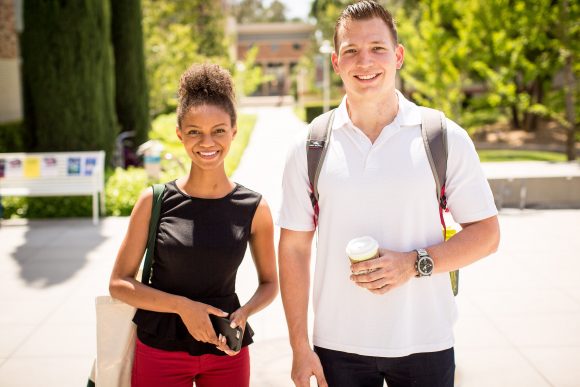 THOMAS: I don’t blame police officers. Everyone has implicit bias. I have it. Like when I’m working with an African-American girl who wants to become a doctor, I can see myself in her. I think community policing is very important, because you have to be able to see yourself in the people in the community. You don’t have to be the same race as them, but you have to be able to see them as people. It’s scary to be a police officer, and it’s scary to work in certain neighborhoods. So I’m not blaming police officers.
THOMAS: I don’t blame police officers. Everyone has implicit bias. I have it. Like when I’m working with an African-American girl who wants to become a doctor, I can see myself in her. I think community policing is very important, because you have to be able to see yourself in the people in the community. You don’t have to be the same race as them, but you have to be able to see them as people. It’s scary to be a police officer, and it’s scary to work in certain neighborhoods. So I’m not blaming police officers.
MOORE: I was reading about records in certain cities, and there does seem to be a disproportionate number of blacks and Hispanics being stopped in some cities.
THOMAS: I was blissfully unaware of my race until I got into college. I think my dad, as a black man, had different experiences. He’d say, “I got stopped for no reason,” and I’d say, “Are you sure you weren’t speeding?” I just so trusted the system. And then I was confronted with Ferguson.
The day of the altercation, I was driving near Ferguson when the radio station shut down and people were asking, “What’s happening? A body has been in the street for two hours.” And at this point the body was still uncovered. People were speculating: Were there 10 shots? Fifteen shots? There was a fight – his hands were down, his hands were up. There was a story in this narrative that was able to form because of misinformation. Then there was a fire close to us, and suddenly we couldn’t get any television coverage. It was insane. That’s why I plan to write a book about my experience in Ferguson, because of all the misinformation. It’s a study in social media.
One of my favorite poems is by Langston Hughes, about Harlem. “What happens to a dream deferred? Does it dry up, like a raisin in the sun? Or fester like a sore – and then run? Does it stink like rotten meat? Or crust and sugar over – like a syrupy sweet? Maybe it just sags, like a heavy load. Or does it explode?”
That kind of describes Ferguson. They were just baking, simmering in the sun, then they exploded. And then I realized I was black. (Laughter.)
MOORE: I know that when we go through traumatic experiences, it’s important to have family and friends and others to rely on. From my understanding, I hear about movements like Black Lives Matter, and I don’t know who is leading it. I think you need people to shine a light on abuses of power, but there are always going to be some people who enter from outside that realm. There are some who will just say “Black Lives Matter” and then throw a chair through a window. Sometimes there is a mob mentality.
It makes me think about what’s happening on some college campuses, where free speech is coming up against people who don’t want to hear from someone who doesn’t think like they do. I think everyone has a right to protest, including to say that they don’t want to hear someone speak. But I think we need to lean on the First Amendment, especially when it becomes a mob mentality, because First Amendment rights often get lost in the mob.
THOMAS: There are a lot of people who say things I don’t like, but I agree that they have the right to say them. However, there’s a difference between sharing ideas and hate speech. I’d like to hear your opinions about that. Should universities coddle people who participate in hate speech, and what is that boundary between just talking and saying things that may incite violence?
MOORE: I tend to stick with what the law says. There’s a debate about whether a school is a government entity or not. In past cases, it’s been decided that a school is covered by the First Amendment, so if it tries to restrict what you say, then generally that’s not allowed. But there are forms of unprotected speech, and one of those is speech that presents an imminent threat to others. Exactly where you can draw that line is unclear to me, even though I’ve studied it.
I do think it’s important that schools promote a variety of views. I think in some cases, universities are trying to bring in speakers who present another view, but people are coming in from outside and shutting down that opportunity. I think in those cases, everyone loses.
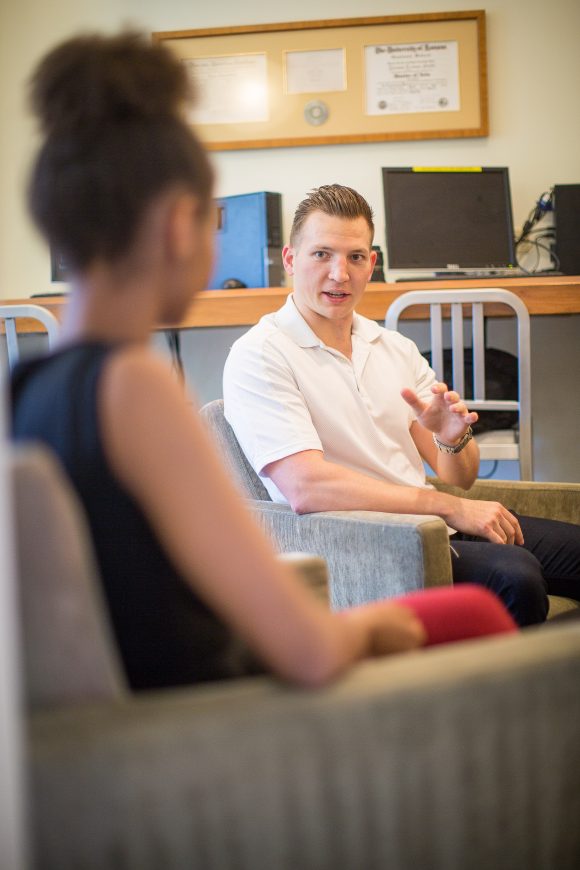 THOMAS: I agree. I want to hear a variety of views. College should be a place where we exchange ideas and get a deeper understanding of issues. One of the reasons I wanted to have this conversation is that I’d like to know more about your views on the role of government and how you came to develop them.
THOMAS: I agree. I want to hear a variety of views. College should be a place where we exchange ideas and get a deeper understanding of issues. One of the reasons I wanted to have this conversation is that I’d like to know more about your views on the role of government and how you came to develop them.
MOORE: I’m an Orange County native; I grew up in Mission Viejo. My father was born in Ohio, and he moved here and never wanted to go back. My family is very conservative, which is common for where I grew up. My views are based on economic and financial incentives. I believe in limited government and less regulation. Clearly there has to be some regulation of businesses to cover unfair practices, and I’m for some environmental regulation. We need taxes because we want good roads and good schools, but the incentives should be there for job growth and innovation.
On social issues, I think I was a bit naïve growing up. I went to Arizona State for my undergraduate degree, and I benefited from meeting a more diverse group of people in college. I came to Chapman to go to law school and pursue an emphasis in tax law. For me, it was a really good decision.
THOMAS: I don’t have a deep understanding of tax policy. I’ve been working since I was 15, so I know something about paying taxes. What can you tell me about President Trump’s tax plan?
MOORE: Well, he wants to bolster the economy and bring jobs back to America. Under his reform proposal, everyone gets an individual rate reduction, so everyone stands to benefit. Then there are corporate taxes. America has the highest corporate rate in the world. Trump wants to bring that down from about 40 percent to 15 percent, which would make it one of the lowest rates. This could incentivize a lot of companies to bring back their manufacturing, production, etc., to the U.S. He has also proposed a 10 percent one-time fee on foreign income, targeting companies like Apple, which has a lot of foreign income in China. So I think he has some interesting proposals. No one knows what companies would really come back, and then there is the question of whether it would increase the deficit.
THOMAS: I’m curious how it would pan out on a social-justice level because it seems like it would just lead to more stratification.
MOORE: That’s a concern. I think the thing about the president is that he knows he’s not the smartest person in the room, so he defers to other people. But is he picking the right people? I think this is true with every president – they are only as effective as their colleagues, including those in Congress. And this president already has seen how hard it is to get things through Congress.
THOMAS: I think the last election shows that a lot of people feel marginalized. A lot of people felt that they were left out.
MOORE: A lot of people voted from a financial perspective.
THOMAS: Where I’m coming from is based less on economics. I’m voting as someone who is black and a woman and who has a sister who is gay. So I come from a social perspective. I have this triple layer of things I need to consider before I look at the financial impact.
MOORE: I think we all come at this starting with the perspective of our background. That’s why discussions like this are so valuable. It’s been great to share this time with you and to learn more about your perspective.
THOMAS: I’ve enjoyed it, too.
Photography by Nathan Worden ’13 (MBA ’15)
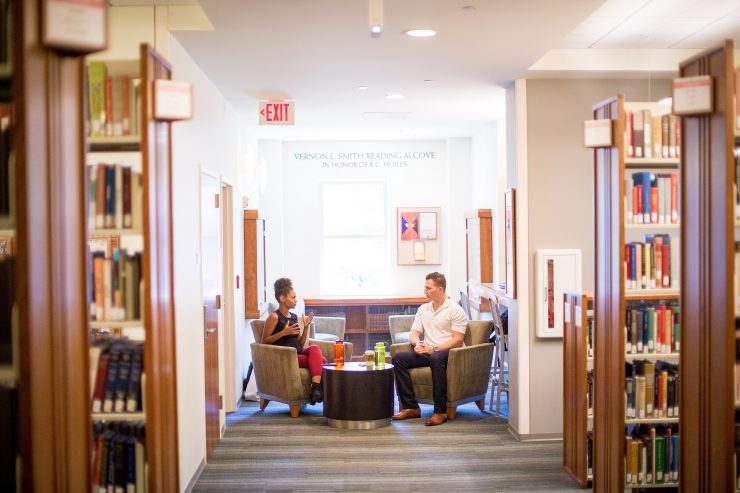

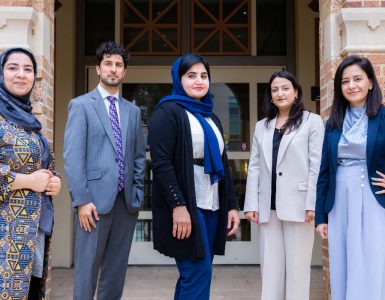
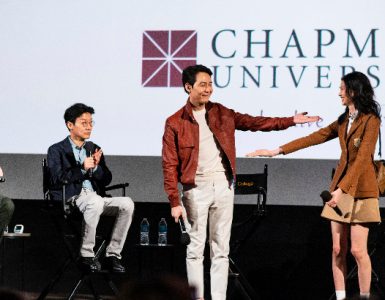

Add comment